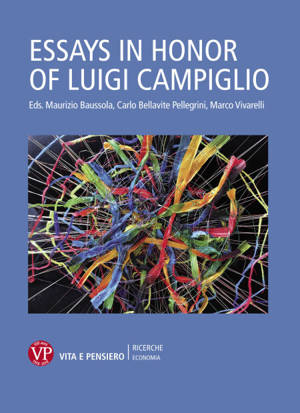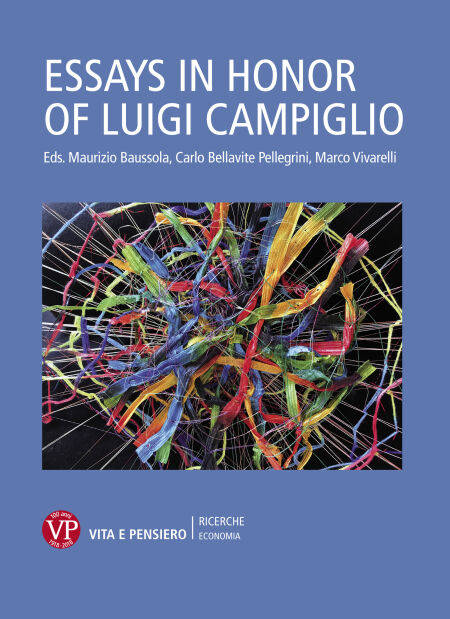
- Retrait gratuit dans votre magasin Club
- 7.000.000 titres dans notre catalogue
- Payer en toute sécurité
- Toujours un magasin près de chez vous
- Retrait gratuit dans votre magasin Club
- 7.000.000 titres dans notre catalogue
- Payer en toute sécurité
- Toujours un magasin près de chez vous
Essays in honor of Luigi Campiglio EBOOK
Marco Vivarelli, Maurizio Baussola, Carlo Bellavite Pellegrini
15,99 €
+ 15 points
Description
This book is a collection of contributions by scholars directly or indirectly involved with Luigi Campiglio's research activity. We aim to celebrate the completion of his tenure at Università Cattolica, after more than three decades, and his significant contribution to teaching and scientific research. The book consists of four parts, each dealing with specific issues that we have grouped into: welfare economics; innovation, industrial change and regional policies; labor economics and growth; financial markets and monetary policy. All these issues are at the forefront of international research and testify to how Campiglio's interests in the field of economics are diversified and rooted in a comprehensive vision, always addressing key policy implications.
Luigi Campiglio graduated in Economics from the Università Cattolica del Sacro Cuore in 1972. The following year he published his first contribution in "Rivista Internazionale di Scienze Sociali", of which he was afterwards chief editor (2006- 2017), and four years later he published his first book. For more than ten years he worked in the private sector, learning to be open-minded and focused on problem-solving. In 1976 he joined the Faculty of Economics at the Università Cattolica and afterwards he left for the University of Essex where he obtained an M.A. in Economics. On his return, he began teaching at the Università Cattolica's Piacenza site. He became Associate Professor and has been Full Professor of Economic Policy at the Università Cattolica since 1990. In 1991 he promoted the development of the Institute of Economic Policy, now a Department, always furthering interdisciplinarity. From 2002 to 2010 he was Deputy Rector of the University. He was a Visiting Scholar at Stanford University and Invited Fellow at Churchill College in Cambridge University, thereby establishing new relationships for Università Cattolica. How to cope with uncertainty and asymmetric information regarding the market mechanism and its instability have been at the centre of his research, and he has devised viable solutions for mechanism design; his contributions include work on economic growth and employment, the price systems of goods and assets, inequality and poverty, well-being and sustainability, European integration, and the political representation of minors.
Luigi Campiglio graduated in Economics from the Università Cattolica del Sacro Cuore in 1972. The following year he published his first contribution in "Rivista Internazionale di Scienze Sociali", of which he was afterwards chief editor (2006- 2017), and four years later he published his first book. For more than ten years he worked in the private sector, learning to be open-minded and focused on problem-solving. In 1976 he joined the Faculty of Economics at the Università Cattolica and afterwards he left for the University of Essex where he obtained an M.A. in Economics. On his return, he began teaching at the Università Cattolica's Piacenza site. He became Associate Professor and has been Full Professor of Economic Policy at the Università Cattolica since 1990. In 1991 he promoted the development of the Institute of Economic Policy, now a Department, always furthering interdisciplinarity. From 2002 to 2010 he was Deputy Rector of the University. He was a Visiting Scholar at Stanford University and Invited Fellow at Churchill College in Cambridge University, thereby establishing new relationships for Università Cattolica. How to cope with uncertainty and asymmetric information regarding the market mechanism and its instability have been at the centre of his research, and he has devised viable solutions for mechanism design; his contributions include work on economic growth and employment, the price systems of goods and assets, inequality and poverty, well-being and sustainability, European integration, and the political representation of minors.
Spécifications
Parties prenantes
- Auteur(s) :
- Editeur:
Contenu
- Nombre de pages :
- 384
- Langue:
- Anglais
- Collection :
Caractéristiques
- EAN:
- 9788834336519
- Date de parution :
- 01-05-18
- Format:
- Ebook
- Protection digitale:
- Digital watermarking
- Format numérique:







